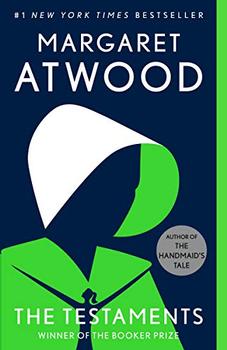Summary | Excerpt | Reading Guide | Reviews | Beyond the book | Read-Alikes | Genres & Themes | Author Bio

Paul Lynch's 2023 Booker Prize–winning Prophet Song is a speedboat of a novel that hurtles the reader through ever-heightening waves toward a dark shore, a stark vision of total societal breakdown.
The narrative follows Eilish Stack, a microbiologist living in suburban Dublin with her husband, Larry, the deputy general secretary of the Irish teachers' union, and their four children, the oldest a teenager and the youngest an unexpected, late-in-life baby. Her father, showing early signs of dementia, lives nearby. Eilish's mind perpetually buzzes with the kinds of thoughts about work and kids and home that sustain a privileged, ordinary life held together by the almost invisible braces of a functioning civil society.
Lynch sets this world to spinning when the police arrive at the family home, looking for Larry. The authoritarian ruling party has introduced emergency measures in response to an unstated crisis. The government suddenly appears darkly inscrutable as it sidesteps the usual legal protocols and arrests dissenters, trade unionists—really, it quickly becomes clear, any person who is declared to be a domestic threat. This includes Larry, who after a late-night interrogation is later summarily arrested at a union march without even a nod to his civil rights, which so recently had felt like bedrock to the Irish state. The family's all-too-fragile edifice collapses as the city transforms around them.
Lynch understands that totalitarianism doesn't simply storm into power; all too often it creeps in, exploiting minor, seemingly harmless administrative policies and incrementally asphyxiating democratic mores, leaving only the specter of terror as the ruling party, their ambitions unmasked, declares that those who are not with us are against us. As the novel proceeds, readers follow Eilish through a cold Kafkaesque nightmare in which family members can get no information about missing relatives, and residents of the city can only seek the false safety of silence, as dissent is dangerous. Those who enter the prisons and military hospitals do not return, and those who disappear leave no trace.
Curiously, as Eilish's world collapses, her rational mind begins to work against her. She cannot grasp the gravity of the situation, it seems. How can she make sense of what she experiences, when it falls so far beyond the pale of what she had dreamed possible in a democratic country such as Ireland? Her only sanctuary, then, is denial. She lies to her children about the situation to protect them and explains away the evidence of danger shadowing over her. Stubbornly, she resists help from her sister, across the ocean in Toronto, who reminds her that "History is a silent record of people who did not know when to leave."
Some readers might find Lynch's break from standard formatting and punctuation unsettling—there are no quotation marks or paragraph breaks, so that each section of a chapter consists of long, solid blocks of text. The overall impact of these stylistic choices, however, echoes the intense, immersive description of the novel's world, the creeping dread of no exit and the clutching fear that gains momentum with the book's pace as the nightmare gallops towards its perhaps inevitable end.
Offering some solace to the reader, Lynch's prose can be both unusual and beautiful: "once the lie is known it will remain outgrown from the mouth like some dead-tonguing poisonous flower."
Prophet Song plays into a deep fear—that civilization will fall into conflict and ruin, that fascism will invade from democracy's back door, opening the way for history's never-ending line of bullies and thieves. But, in the end, Lynch reminds us that a democracy's demise may also occur through the stealthy creep of far subtler agents, whether the slow strangulation of individually innocuous statutes or our stubborn insistence that an old reality remains.
![]() This review was originally published in The BookBrowse Review in February 2024, and has been updated for the
December 2024 edition.
Click here to go to this issue.
This review was originally published in The BookBrowse Review in February 2024, and has been updated for the
December 2024 edition.
Click here to go to this issue.

If you liked Prophet Song, try these:

by Rumaan Alam
Published 2021
A magnetic novel about two families, strangers to each other, who are forced together on a long weekend gone terribly wrong.

by Margaret Atwood
Published 2020
In this brilliant sequel to The Handmaid's Tale, acclaimed author Margaret Atwood answers the questions that have tantalized readers for decades.
Your guide toexceptional books
BookBrowse seeks out and recommends the best in contemporary fiction and nonfiction—books that not only engage and entertain but also deepen our understanding of ourselves and the world around us.